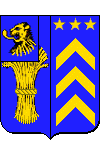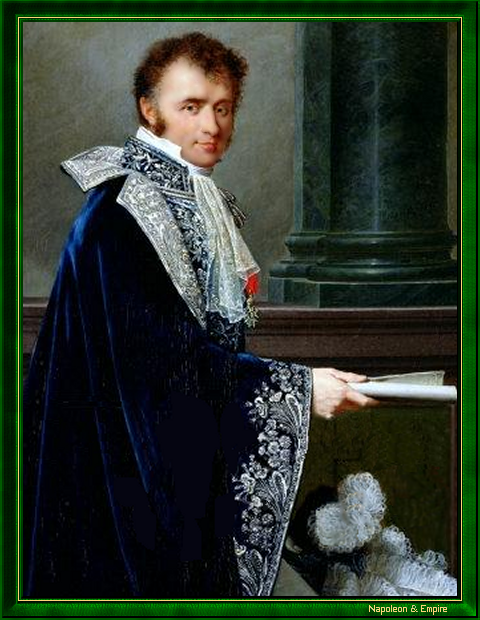Nicolas-François Mollien
Count of the French Empire
Pronunciation:

Nicolas-François Mollien was born on February 28, 1758 in Rouen, where his father owned a large passementerie factory. From an early age, he showed a passion for economics and, at the age of twenty, joined the Ministry of Finance. Employed first in the supervision of general farms, then in the general control of Finance, he met Antoine Lavoisier, himself a general farmer, whose Memoir on the taxation of consumer goods received his support. The adoption of the proposed provisions led to the creation of the Paris octroi barriers.
In 1792, Mollien left the administration to run a cotton mill. Shortly afterwards, during the Terror, he was arrested for his former relations with the fermiers généraux and imprisoned with them. He narrowly escaped the guillotine, saved by the 9th Thermidor.
In 1798, he spent some time in England, learning about local financial and monetary mechanisms. The following year, Martin Michel Gaudin, his ex-colleague and now minister, entrusted him with the management of the newly-created Caisse d'amortissement.
Quickly appreciated by the First Consul for his competence and technical knowledge, from 1801 onwards he became one of his privileged interlocutors, frequently consulted on banking matters and tasked with writing a daily report on the day's financial events and the mood of the stock market. Napoleon Bonaparte's confidence in him earned him a great deal of envy, starting with Charles-Maurice de Talleyrand-Périgord.
Appointed State Councillor in 1804, he replaced François de Barbé-Marbois as Minister of the Treasury in 1806, after a violent stock market crisis. Having successfully restored the country's compromised finances, he was created Count in 1808.
From 1810 onwards, Mollien had to face up to Napoleon's increasingly peremptory and unrealistic demands. Avoiding discussion, he responded, when reproaches became too pressing, by simply providing arithmetical proof of the impossibility of carrying out the orders he had received. The Emperor, while criticizing his minister for rejecting bold measures and expedients, nonetheless gave in to the force of things, which, to his astonishment, had just demonstrated that it could surpass the efforts of his servants. And so Mollien retained his position right up to the final hours of the Empire.
Loyal to the end, he followed empress Marie-Louise to Blois in 1814, and lived out the first Restoration in retirement.
As soon as he arrived in Paris on March 20, 1815, Napoleon recalled him and once again entrusted him with the Treasury. His services were invaluable, above all in inspiring confidence among financiers.
After Waterloo, he retired again, until his appointments to the Chamber of Peers and as Chairman of the Supervisory Board of the Caisse des Dépôts et Consignations in 1819.
He died in Paris on April 20, 1850, the last surviving minister of the Empire, not without a visit from Prince-President Louis-Napoléon Bonaparte. He is buried in the Morigny-Champigny cemetery in Essonne.
"The Count Nicolas-François Mollien" by Robert Jacques François Faust Lefèvre (Bayeux 1755 - Paris 1830).

Although he was Minister of the Treasury for almost ten years, in his Memoirs he makes no secret of his disapproval of Napoleon's economic dirigisme.